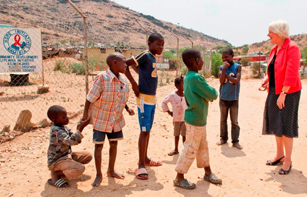
The Mister Sister Mobile clinic parked outside the office of Hope Initiative SA—a community-based organization that provides care and support services for orphans and vulnerable children in the informal settlements around Windhoek.
Credit: UNAIDS/T.Figuera
Similar to many other countries, Namibia’s population has been shifting towards towns and cities in search of better opportunities and hoping for a more prosperous life. Urbanization has led to the growth of informal settlements surrounding major cities and towns making it difficult to reach residents with critical health services.
Namibia’s capital City of Windhoek—whose population grew by 38% between 2001 and 2011—has partnered with UNAIDS, UNDP and PharmAccess Foundation to strengthen its overall health and HIV response with innovative options such as mobile clinics.
“The City of Windhoek is committed to delivering efficient and effective municipal health services to all Windhoek residents, in particular underserved populations,” said the Chief of Health Services for the City of Windhoek, Mary-Anne Kahitu. “Through our strategic partnerships—such as with the Ministry of Health and Social Services, PharmAccess Foundation and other key stakeholders—we will endeavor to promote increased access to quality health and HIV services in informal settlements,” she added.
During a period of 18 months, the joint project "Strengthening city responses to HIV/AIDS" explored the city’s urban HIV epidemic and response. Findings included a household survey showing that HIV incidence and prevalence appeared to be higher in the north-western area of Windhoek, which is primarily characterized by informal settlements and low-income formal housing. The study highlighted that these areas had limited access to adequate HIV prevention and treatment services—such as antiretroviral treatment, HIV counselling and testing and services to stop mother-to-child transmission of HIV.
Mobile health services
The findings of the study prompted collaborative action between PharmAccess Foundation, the City of Windhoek and the Ministry of Health and Social Services to provide mobile health services. Twice a month, a mobile clinic visits the informal settlements. Supported through the PharmAccess’ Mister Sister Mobile clinic project, the Ministry provides all medicines for the operation of the clinic free of charge.
The City of Windhoek is committed to delivering efficient and effective municipal health services to all Windhoek residents, in particular underserved populations
Chief of Health Services for the City of Windhoek, Mary-Anne Kahitu
The first mobile clinic was parked outside the office of Hope Initiative SA (HISA), a small community-based organization that provides care and support services for orphans and vulnerable children in the informal settlements around Windhoek.
“It is very important to have a mobile clinic in informal settlements because without it, children and vulnerable people would definitely not have access to medical help,” said Patricia Sola, Founder of Hope Initiative. “Our nearest clinic is more than an hour walk away, not to mention the cost of being seen by a doctor.” For HISA, the clinic also brings an opportunity to give information to patients on access to social grants and birth registration.
The primary health care services provided the same kind of services the Ministry offers in its health care facilities. These include family planning advice and supplies, routine immunizations, child growth monitoring, screening for TB symptoms and referral, diagnosis and treatment of routine communicable disease, HIV testing, and referral and follow up on chronic diseases.

UNAIDS Deputy Executive Director, Management and Governance, Jan Beagle chats with a group of children during her recent visit to Namibia.
Credit: UNAIDS/T.Figuera
In August 2012, PharmAccess began expanding its operations into the rural and remote areas of Khomas and Omaheke regions with two additional mobile clinics. “PharmAccess Namibia is very proud to provide primary health care services to the people who need it most in Windhoek’s poorest informal settlements,” said Ingrid De Beer, Managing Director of Pharm Access in Namibia. “Our partnership with the Ministry of Health and Social Services, supported by Mister Sister Partners and the City of Windhoek, has made this possible. In the coming months, we look forward to collecting the evidence required to inform local policies on primary health service provision in the informal settlements of greater Windhoek,” she added.
In a recent visit to Namibia, UNAIDS Deputy Executive Director, Management and Governance, Jan Beagle, along with representatives of partner organisations involved in the project, commended the City of Windhoek and the Ministry of Health and Social Services for its leadership and commitment to strengthening the city's response to HIV.
Ms Beagle highlighted the excellent partnership between the community, civil society and government to meet the health needs of vulnerable populations in informal settlements around Windhoek and emphasized that “such innovative initiatives should be scaled up and replicated across the country.”





